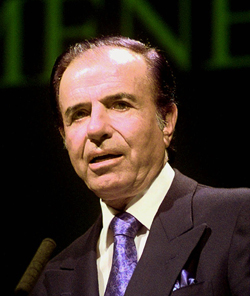New York, September 12, 2011–A lawsuit alleging invasion of privacy brought by Argentina’s former president, Carlos Saúl Menem, against two journalists with the local newsweekly Noticias violates Article 13 of the American Convention on Human Rights, the Committee to Protect Journalists said in a legal brief filed Friday before the Costa Rica-based Inter-American Court of Human Rights.
This is the first case brought in the Inter-American system that involves a privacy claim stemming from a report on matters of public concern. CPJ believes it is vital for the court to set a precedent of protecting journalists’ rights at a time when leaders in Latin America and around the world are using a barrage of legal actions to stifle critical reporting.
“No less than an unjustified criminal prosecution, abusive civil litigation is a devastatingly effective means for powerful public officials to silence journalists who work to hold them to account,” the CPJ legal brief stated.
CPJ also urged the court “to hold that it is a violation of the right to free expression for a public official to harass a journalist through a retaliatory civil lawsuit.” The court held hearings about the case in August. A decision may take several months.
The amicus curiae brief, which was filed before the regional court, was prepared for CPJ by the New York law firm Debevoise & Plimpton LLP, whose lawyers include Jeremy Feigelson, Erik Bierbauer, and CPJ board member and prominent First Amendment attorney James C. Goodale.
The case stems from a 1995 suit filed by then-President Menem against Jorge Fontevecchia and Héctor D’Amico, the founder and managing director, respectively, of Noticias, a magazine based in Buenos Aires that is known for its investigative journalism. The former president alleged that two 1995 articles about his extramarital relationship with Martha Meza, a former schoolteacher who then became a provincial deputy for Menem’s Peronist party, had invaded his privacy.
Noticias, citing previous, widely published, credible reports and statements by Meza, reported that the former president was the father of Meza’s son, who was born in 1981. The magazine reported that while he was president, Menem gave lavish gifts and large amounts of money to Meza, set up a US$1 million trust fund for the child, and pulled strings to have the government of Paraguay protect Meza and her son when she said the boy had been threatened. Menem never questioned the accuracy of the magazine’s reporting. He acknowledged in 2007 that he fathered the boy. The magazine’s reports were published amid allegations by international watchdog organizations and Menem’s political opponents that corruption was widespread in Menem’s government.
In 1997, a local court rejected Menem’s claims, but an appeals court overturned the ruling in 1998. On September 25, 2001, Argentina’s Supreme Court, whose nine justices included six Menem appointees, held Fontevecchia, D’Amico, and Editorial Perfil, Noticias‘ publishing company, liable for invading Menem’s privacy. The court ordered the defendants to pay Menem 60,000 pesos in damages (US$60,000 in 2001) plus legal costs of 244,323.25 pesos (US$84,000 in 2005, when the final payment was remitted). Argentina has acknowledged before the Inter-American Court that the Argentine judiciary was too close to Menem to be truly independent.
During his decade in office in the ’90s, Menem used a flurry of lawsuits in an attempt to stifle the vibrant Argentine press, CPJ research showed. These included multiple suits against the publisher of Noticias.
After exhausting all domestic legal remedies, the case reached the Washington, D.C.-based Inter- American Commission of Human Rights (IACHR) in November 2001. In July 2010, the IACHR found that Argentina’s Supreme Court had imposed limitations on the journalists’ freedom of expression and recommended that the state revoke the sentence. In December, after Argentina failed to comply with the commission’s recommendations, the IACHR filed the case before the Inter-American Court.
“Just as violence and criminal prosecution represent a threat to freedom of expression, so do politicized lawsuits like the one brought by former President Carlos Saúl Menem,” said CPJ Executive Director Joel Simon. “We believe that these complaints violate international guarantees on freedom of expression and we hope to make that case before the court.”
In the brief, CPJ states, “Journalists should never be legally harassed or punished for accurate reporting on matters of public concern involving public officials. In holding the journalists liable for invading President Menem’s privacy, Argentina ignored the great political importance of the matters reported by Noticias and the fact that Menem suffered no cognizable harm from their publication. Argentina made an example of Petitioners and sent a clear and threatening message to its press: report on politicians and risk financial ruin.”
The recently launched CPJ special report “Confrontation, repression in Correa’s Ecuador” highlights the use of criminal and civil prosecutions to target critical journalists. Like Ecuadoran President Rafael Correa, other Latin American and world leaders target critical journalists with legal actions. In many cases, like in Ecuador, these actions have led to censorship. “Faced with the risk of meritless legal claims, interminable and costly litigation before rigged national courts, and large damage awards, even the bravest journalists think twice before reporting on possible misconduct by a public official,” the CPJ brief said.
The full brief can be downloaded here.
